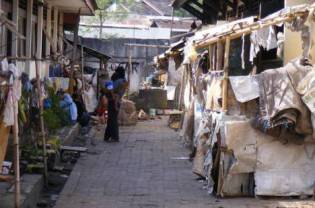Solidarity versus resentment
by Taha Kehar
Friday, 20 August 2010
Friday, 20 August 2010

Pakistanis today need solidarity and a clear understanding of the Islamic democracy Jinnah had envisioned. PHOTO: AFP
At a Press Conference at New Delhi, on July 14, 1947, Jinnah was grilled by a correspondent who wished to inquire as to whether Pakistan would be a secular state or a theocracy.
Jinnah hinted at the absurdity of the question, adding, quite tactfully, that he did ‘not know what a theocratic state’ meant. The correspondent had then fervidly suggested that it was ‘a state where only people of a particular religion, for example, Muslims, could be full citizens and non-Muslims would not be full citizens’. Apprised with this vision of a theocracy, Jinnah aptly stated that ‘when you talk of democracy, I am afraid you have not studied Islam – we learned democracy thirteen centuries ago.’
However, it seems as though Islam in Pakistan has lost its democratic appeal for even though minority rights have been safeguarded, the Muslim community has failed to preserve the rights of the Ahmadis. Glaring illustrations of this claim are the events that led up to the declaration of Martial Law in Lahore in 1953 and, more recently, the attack on an Ahmadiyya mosque in Lahore on the May 28, 2010. This exhibits the dwindling solidarity of the Muslim community and serves to further demonstrate that insurgency in the troubled North-western wing of Pakistan has taught us zilch. What ideological justification is there for those who share a creed to fight one another? An astute observer would put forth three deep-set explanations:
1) The war on terror
2) Assailing the extremist elements and providing a scope for moderation
3) Eternal Peace
What is striking to note is that all these justifications are fundamentally interlinked. The first rationale is an oft-touted ploy which ironically contradicts the second line of reason. As for the third reason, it is purely optimistic and therefore unlikely to be attained any time soon.
Then why is it that the Islamic democracy which Jinnah alluded to at that press conference all those summers ago has grown stale? Have we become theocratic in a unique sense? Are we assaulting the integrity of the minority sections within our own ravaged Muslim euphoria or have we become overly generous to the religious and cultural minorities at the expense of our own marginalised factions?
The explanation is far more intricate than one would assume. It is laden with ‘grey areas’ as opposed to the standard ‘black and white’. Hence, it is apt for the reader to have the final word. But prior to that, it is essential to note that Jinnah’s vision was one of diversity. His advocacy for religious tolerance was not purely restricted to minority groups. He wanted for us to delve deeper and understand its intrinsic worth so that one day the Muslim community can counterbalance its ideological variations and extend its acceptance of conflicting points of view to people of all religious persuasions with poise. Perhaps that would be a more suitable strategy for acquisition of world peace, moderation and the age-old democratic principles of Islam.
URL: http://blogs.tribune.com.pk/story/1137/solidarity-versus-resentment/
Jinnah hinted at the absurdity of the question, adding, quite tactfully, that he did ‘not know what a theocratic state’ meant. The correspondent had then fervidly suggested that it was ‘a state where only people of a particular religion, for example, Muslims, could be full citizens and non-Muslims would not be full citizens’. Apprised with this vision of a theocracy, Jinnah aptly stated that ‘when you talk of democracy, I am afraid you have not studied Islam – we learned democracy thirteen centuries ago.’
However, it seems as though Islam in Pakistan has lost its democratic appeal for even though minority rights have been safeguarded, the Muslim community has failed to preserve the rights of the Ahmadis. Glaring illustrations of this claim are the events that led up to the declaration of Martial Law in Lahore in 1953 and, more recently, the attack on an Ahmadiyya mosque in Lahore on the May 28, 2010. This exhibits the dwindling solidarity of the Muslim community and serves to further demonstrate that insurgency in the troubled North-western wing of Pakistan has taught us zilch. What ideological justification is there for those who share a creed to fight one another? An astute observer would put forth three deep-set explanations:
1) The war on terror
2) Assailing the extremist elements and providing a scope for moderation
3) Eternal Peace
What is striking to note is that all these justifications are fundamentally interlinked. The first rationale is an oft-touted ploy which ironically contradicts the second line of reason. As for the third reason, it is purely optimistic and therefore unlikely to be attained any time soon.
Then why is it that the Islamic democracy which Jinnah alluded to at that press conference all those summers ago has grown stale? Have we become theocratic in a unique sense? Are we assaulting the integrity of the minority sections within our own ravaged Muslim euphoria or have we become overly generous to the religious and cultural minorities at the expense of our own marginalised factions?
The explanation is far more intricate than one would assume. It is laden with ‘grey areas’ as opposed to the standard ‘black and white’. Hence, it is apt for the reader to have the final word. But prior to that, it is essential to note that Jinnah’s vision was one of diversity. His advocacy for religious tolerance was not purely restricted to minority groups. He wanted for us to delve deeper and understand its intrinsic worth so that one day the Muslim community can counterbalance its ideological variations and extend its acceptance of conflicting points of view to people of all religious persuasions with poise. Perhaps that would be a more suitable strategy for acquisition of world peace, moderation and the age-old democratic principles of Islam.
URL: http://blogs.tribune.com.pk/story/1137/solidarity-versus-resentment/
















